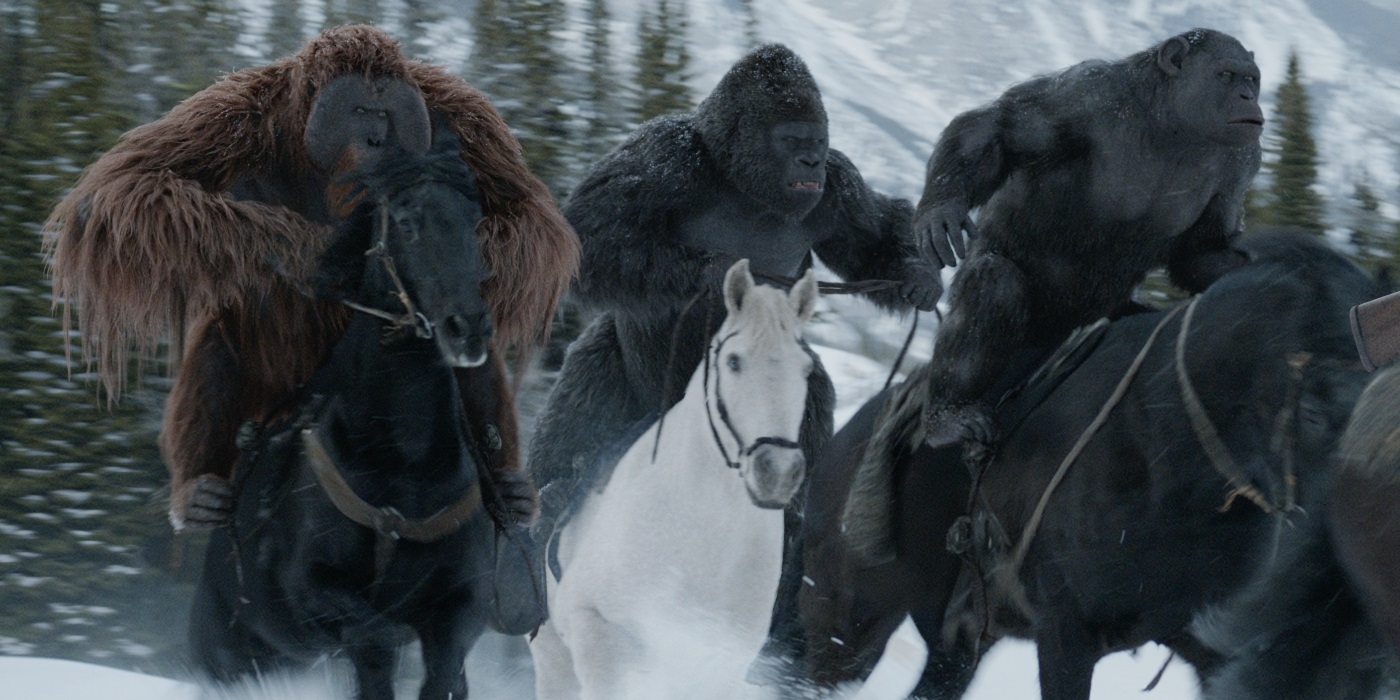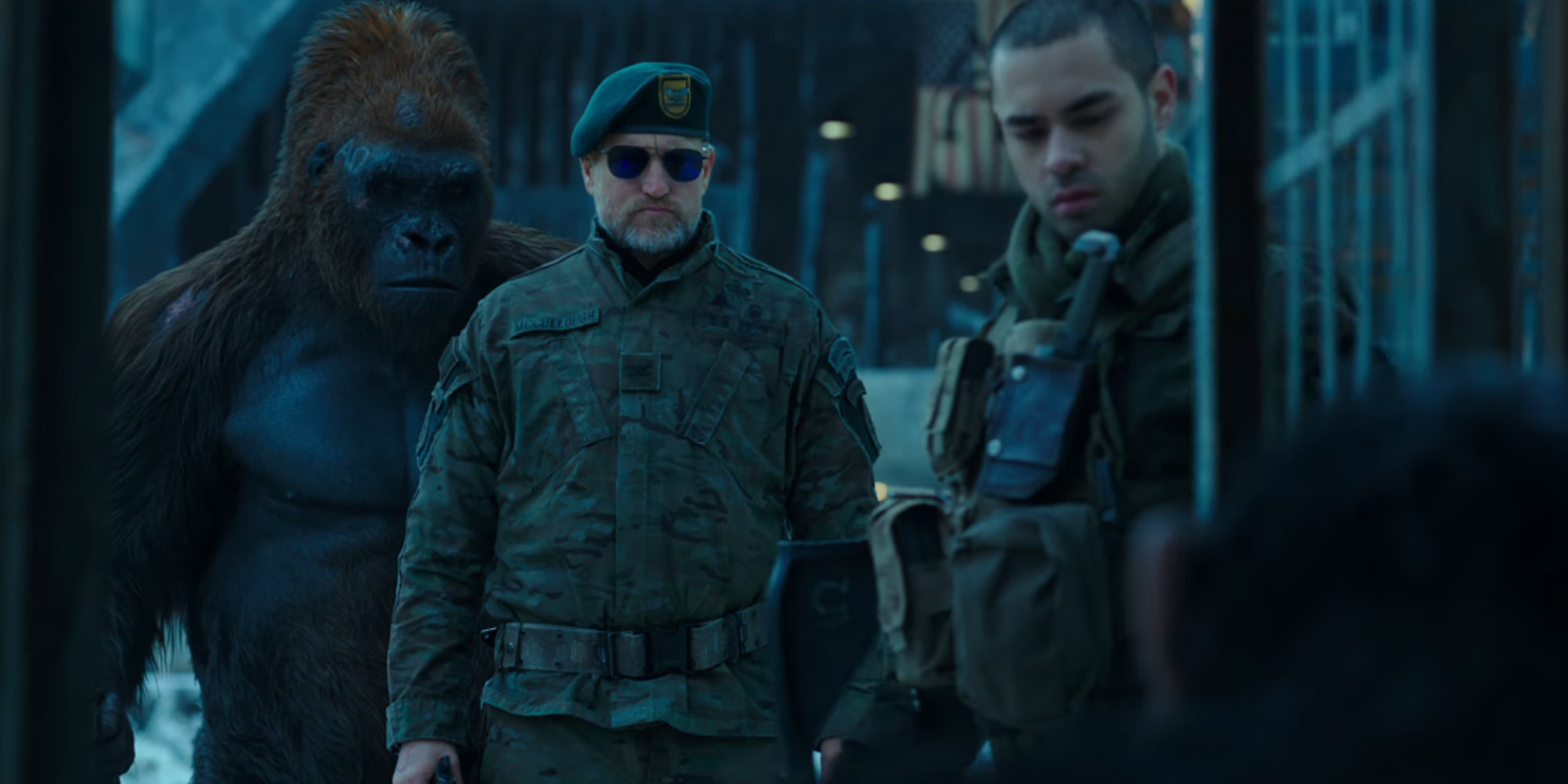5. It offers an unconventional approach to blockbuster storytelling

The narrative pattern of blockbuster storytelling (the hero is introduced; the hero faces the villain; the hero and the villain fight; the hero suffers a setback; the hero rallies; the hero and villain fight again; the hero wins; Robert Downey Jr. cashes his paycheck) is carved so deeply into the grain of popular culture that often, it’s easy to feel like you’ve seen certain movies before you’ve even bought a ticket. By contrast, “War for the Planet of the Apes” utilizes a handful of familiar tropes, yet offers a remarkable revise of Big Hollywood formulas.
That’s especially true of the passages of the film where Caesar and Maurice wander across a series of mostly deserted, yet utterly beautiful landscapes as they search for the Colonel. While their objective is as clear as the sunlight that shines on the day they meet Nova, their quest includes unexpected detours, including a chilling encounter with a lone, armed human, and their introduction to Bad Ape, which takes place inside what appears to be a cross between a ski lodge and the Shrieking Shack in “Harry Potter.”
During these scenes, the plot’s heartbeat doesn’t pound too heavily—if not for their futuristic (neo-prehistoric?) surroundings and their mission, Caesar and friends might just be drifting poetically, like Scarlett Johansson in “Lost in Translation.”
And while that might sound strange for a film with a $150 million production budget, it’s what frees “War” from the strictures of modern blockbuster storytelling and gives it an anything-can-happen vibe that heightens each surge of emotion or suspense. Caesar may be the embodiment of archetypal heroism (in one scene, he’s strapped to a cross), but the movie around him moves to an at times unusual rhythm and is all the more engaging and haunting for it.
6. It questions the concept of humanity

In his shrewd review of “War for the Planet of the Apes” in The New York Times, A.O. Scott wrote that the film’s humans are “a species that has abandoned any but a biological claim to the name human.” He has a point, but the most interesting part of that sentence is what’s unsaid: that often, words like “human” and “humanity” are not only used to describe a species, but to nod toward a compassion and emotional vulnerability that we believe is nestled in even the worst of our kind.
With defiant, I’ve-seen-too-much intelligence, “War” uses its depiction of the Colonel to complicate that belief. He may tout himself as a champion of humanity, but everything about him—from his inability to show mercy to his rigid survival-of-the-fittest mentality—makes him, ironically, the movie’s most animalistic character (that said, the film’s nuanced portrayal of the apes seems designed to redefine what “animalistic” means).
Just as importantly, the movie vigorously argues that compassion and emotional vulnerability aren’t unique to humans—an idea that’s illuminated in a scene where the Colonel tells Caesar of a virus that is stripping humans of their ability to speak (that’s what happened to Nova). It’s a disease that terrifies the Colonel—without a voice, he believes he would no longer be truly the human. Yet the movie contradicts his childish belief with its depiction of Nova, who doesn’t utter a single word during the course of the film, yet displays an empathy that recalls humankind at its best (in one of the film’s most tender scenes, she tries to comfort a captured Caesar by passing him a rag doll through the bars of his cell).
She’s like the apes in that way. Caesar and his comrades, we discover, are not so different from contemporary humans—they seethe, they fight, they love, they debate (in sign language and, in some cases, English)—but above all, they prove themselves capable of being kind in ways that are beyond the Colonel (most notably when they adopt Nova). Which suggests that, along Scott’s line of thinking, your humanity is determined not by your biology, but by what you choose to do with it.
7. The final encounter between Caesar and the Colonel challenges the audience’s perception of good and evil

SPOILERS AHEAD
When it comes time for apes and humans to meet for one last mano a mano, Caesar has only one desire: to find and kill the Colonel. This, however, proves tricky: When battle ignites, he’s nowhere to be found. That’s perplexing, since the Colonel has made it clear that he yearns to slaughter apes, leaving you and Caesar to wonder why he’s sitting out this science fiction saga’s answer to the Battle of Endor in “Return of the Jedi.”
An answer materializes when Caesar enters the Colonel’s dingy quarters and finds an open flask and his nemesis lying facedown on his bed, from which he greets his Caesar with a throaty, strangled noise. At first, it sounds like he’s mocking his foe—until, that is, it becomes clear that the Colonel has been infected with the speech-obliterating virus, which he did everything in his power to destroy. For Caesar, this is the moment to press his advantage, the moment to defiantly claim his revenge. So he aims his gun at the Colonel, grimacing with rage and pain, ready to pull the trigger and destroy the man who destroyed half of his family…and doesn’t take the shot.
Why? Perhaps because seeing the Colonel stripped of his self-perceived dignity reminds him that while this man is a monster, but he’s also pitiable in his inability to realize that the loss of his speech doesn’t have to mean the death of his humanity. And while a less-kind decoder of Caesar’s decision might suggest that Caesar didn’t have to kill a man who he knew would almost certainly kill himself (which the Colonel does), one thing is certain: During the Colonel’s final moments, all pretensions of warmongering and masculine posturing vanish for both him and Caesar. In that respect, they both rediscover their humanity.
8. It’s one of the most moving films of the year

In 2007, the ingenious film critic Manohla Dargis wrote “that without the human factor a blockbuster is nothing but a big empty box.” She’s absolutely right. Moviegoers may swoon at larger-life-images, but when it comes to blockbusters, we get hooked not only by inevitably epic conflagrations, but by the pricks of intimacy that pierce them—whether it’s a glimpse into Sarah Conner’s rage-filled psyche in “Terminator 2: Judgment Day” or the fleeting yet powerful look of understanding that Charlize Theron and Tom Hardy exchange across a crowd in “Mad Max: Fury Road.”
Like those pumped-up yet well-filigreed spectacles, “War for the Planet of Apes” transcends the label “blockbuster” and earns the right to simply be called “a film” (a feat that, let’s face it, is rarely achieved by movies of a certain scale). That’s largely thanks to Reeves, who handles the film’s pyrotechnics with sublime clarity and precision, but also solidifies his status as a grand-scale humanist in the tradition of Christopher Nolan, particularly in two wrenching but magnificent moments.
Both of those spotlight the touching relationship between Nova and a gorilla named Luca (Michael Adamthwaite), a pairing that recalls cinema’s many beauty-and-beast combinations. Time will tell how long this one will loom in popular culture, but one thing is certain: moviegoers who see “War” certainly won’t forget the powerful, entrancing scene where Luca takes a pink blossom from a tree and gives it to Nova.
That tender gesture later becomes tinged with tragedy when Luca dies defending Caesar. Yet you can’t help but feel heartened by the sight of a tearful Nova returning that blossom to Luca in the scene where he passes away—not to repay him for his kindness, but simply because she loves him. It’s an exquisite scene—you could gush for hours over the delicate and forceful emoting of the actors—and it sums up why “War for the Planet of the Apes” means so much: it reminds us that if two beings as different as Luca and Nova can love each other, than maybe the rest of us can too.
Author bio: Bennett Campbell Ferguson is a freelance film critic and culture writer based in Portland, Oregon. In addition to reviewing films for Willamette Week, he founded the blog T.H.O. Movie Reviews, which he also edits.